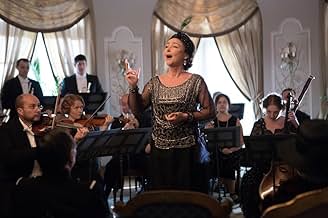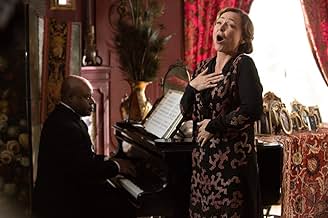Es día de fiesta en el castillo de Marguerite Dumont. Canta de todo corazón, pero terriblemente desafinada. Marguerite ha estado viviendo su pasión en su propia burbuja, y la audiencia hipóc... Leer todoEs día de fiesta en el castillo de Marguerite Dumont. Canta de todo corazón, pero terriblemente desafinada. Marguerite ha estado viviendo su pasión en su propia burbuja, y la audiencia hipócrita actúa como si fuera la diva que cree que es.Es día de fiesta en el castillo de Marguerite Dumont. Canta de todo corazón, pero terriblemente desafinada. Marguerite ha estado viviendo su pasión en su propia burbuja, y la audiencia hipócrita actúa como si fuera la diva que cree que es.
- Dirección
- Guionistas
- Elenco
- Premios
- 7 premios ganados y 15 nominaciones en total
- Dirección
- Guionistas
- Todo el elenco y el equipo
- Producción, taquilla y más en IMDbPro
Opiniones destacadas
I fell in love with all of the characters, even those who used Marguerite and those that tried to swindle her – they were just so well written and full of life. And you can't help but love those who supported and stood by her.
The ending was also surprisingly heart-wrenching, but fitting and sadly satisfying.
Rather than give away too much of the plot; i'd would prefer to sing the praises of the panoply of elements that make this movie so memorable and commendable. It is beautifully staged and executed, with a faithful commitment to the period and a skillfully cast ensemble of actors to back the leading lady. I was especially impressed with Congolese actor Denis Mpunga who lends such a solid and fascinating literal support as Marguerite's butler. Michel Fau steals every scene he is in as an overly hammy opera singer; and Andre Marcon manages to both represent and challenge the archetype of a philandering husband.
While the film does run long; a shade over 2 hours; for the most part it is compelling, intriguing, amusing, sad and thought provoking. How many movies can be described that way? There were moments where I was both laughing and crying; a result of powerful direction by Xavier Giannoli who also co-wrote the film, and of course the impeccable performance from Catherine Frot. There is enormous dignity that the actress conveys as well as a hapless and at times a quiet knowing which is hugely endearing and makes Marguerite neither a victim nor a focus for ridicule. La Frot has such cinematic presence and yet at times there is great stillness to the performance; and of course there is the full bodied musical pieces that anchor the film's structure and themes.
There is a majesty to the film cinematically; and despite a couple of plot strands hastily thrown in and not satisfyingly completed, there is a potency and cogency to the script and to the film's overall running time. I feel it will be one of my favorites of 2016.
Naturally, there are two possibilities of Marguerite's apparent oblivion of her own ludicrous voice, a more plausible one is she is fully cognisant of her inadequacy but she is not deterred by it, since she has the wealth to squander, she doesn't mind (or can endure) to be the object of ridicule, as long as it pleases herself and hogs the spotlight due to her self-centred disposition; an alternative possibility could be, she actually doesn't entirely realise how awful her singing capacity is, because, maybe she has some hearing disability or very often, in reality, the recording of one's own voice sounds rather different from what one habitually conceives of, still, the scenario in the case of Marguerite is more serious, in Giannoli's script, she is building castles in the air, what enters in her own ears (while she is singing), assures that she is a qualified coloratura (or mezzo) with distinct talent, an autodidact achieves her faculties by persistent practice. I don't know if there is a medical term for her deep-rooted delusion, or more practically, it is simply Giannoli's creation, which sets to hone the climax, to see what will happen if she hears her real voice from a record player.
In that case, Marguerite is really a wretch despite of her blessed (or cursed) wealth, she is a woman engulfed by lies and pretence, her husband George (Marcon), marries her for the enormous fortune, haunted by guilt, which by the way doesn't stop him from conducting an extramarital affair, and has no guts or whatsoever to rescue her from the elephant-in-the-room; others regard her as a laughing stock, either egg her on or refrain from candour for their own sake, including the opportunistic young reporter Lucien (Dieuaide) and his poet friend Kyrill (Fenoy), who merely exploits her as an anomaly for his own anarchic propaganda.
It is riveting to watch Catherine Frot feigns her impassioned performance under the salvo of off- key ululation, which is carefully meted out to aptly eke out laughter in each of the film's five chapters. Besides, Ms. Frot doesn't yield to the simplified caricature of Marguerite, in lieu, her self- possessed mannerism glistens with bons mots, she balances off Marguerite's larger-than-life image with endearing subtlety which reflects her as a sensible human being, she is, after all, a woman dares to be honest with her own passion and feelings, against all odds. Comedian Michel Fau is pre-eminent in his flamboyant turn as Marguerite's singing coach Atos Pezzini, a gay opera singer, who is blackmailed into accepting this impossible task by Marguerite's loyal butler Madelbos (Mpunga), who, undoubtedly, is the most inscrutable player in Marguerite's enterprise, with his own agenda which is applied as a game-changer in the end but rings hollow in its own seriousness.
Shot entirely in Czech Republic, as a fill-in for Paris, the film adopts a more subdued palette of the roaring 20s, albeit of its amazingly detailed vintage decor, as if Giannoli tries to forewarn us of the finale throughout the whole journey, MARGUERITE is not a farce of titbits, she is a by-product comes to fruition in a hypocritical society, you can mock her, but she actually accomplish something few of us dare to even start with.
Couple of comments: this is the latest movie from French quality director Xavier Giannoli who previously brought us other high quality films like "When I Was A Singer" and "In the Beginning". Here he tackles a variation of "the emperor has no clothes" story. It is clear to anyone that Marguerite cannot hold a note, yes she gathers acclaim, be it because people think she is brave enough to do it, and/or because she is delusional, and/or because people want to remain in her good graces. When, in preparation for her first bi-scale public concert, her exasperated music teacher comments to Marguerite's husband "Who will throw the first stone?", that becomes the main point of the movie: will Marguerite be told the stone-cold truth or not? Catherine Frot brings a towering performance as Marguerite, and in fact won the French equivalent of the Best Actress Oscar for this (the movie was nominated for a BUNCH of Cezar Awards, including Best Film and Best Director). My only complaint is that at 2 hr. 10 min. the movie is a bit too long for its own good. I think that trimming 15-20 min. would've made for a tighter movie without losing any of the narrative. The "inspired by true events" line at the beginning in fact refers to New York socialite Florence Foster Jenkins, and coincidence or not, a movie about her, starring none other than Meryl Streep in the title role, is set for a release in US theaters in just a few months (August, I believe). I'll be interested in checking out that one too, to see how it compares with this.
"Marguerite" opened this weekend at my local art-house theater here in Cincinnati. The Saturday early evening screening where I saw this at was attended quite nicely, somewhat to my surprise. Maybe the fact that the Meryl Streep movie is coming out soon (and is already gathering buzz for Streep's supposedly stunning performance) has increased the interest in seeing the French movie version. Regardless, if you like classical music (of which there is a TON in the movie) and are up for a top-notch foreign movie with great performances, you cannot go wrong with this. "Marguerite" is HIGHLY RECOMMENDED!
¿Sabías que…?
- TriviaThe name of the title character is a gallicised form of Margaret Dumont, the dignified lady with the figure of an old-time opera singer who was the foil for the Marx Brothers' gags.
- ErroresPlaced in Paris starting from September 1920, and with an almost faithful commitment to the period, except for the sequence when Marguerite, Baronne Dumont sings whilst motion picture images are first projected onto a white sheet and then onto her white clothing. Incorrectly there is the use of a 16mm silent movie film that appears to be projected from a 16mm film projector, however 16mm film was not invented by Eastman Kodak in the USA until 1923. In France in 1922 Pathé Frères invented their 9.5mm silent movie film as part of the Pathé Baby amateur film system, which would have been more likely to be in use in this era.
For the era the incorrect number countdown leader is projected, and any fully trained projectionist would notice the error, and in 1920 we see the 1965 "SMPTE Universal Leader" that was designed and used for television projection applications. Featuring a continuous countdown from eight to two (measured in seconds, rather than feet), with the numbers in the center of a target with two white circles and a rotating "clock arm" animation. "SMPTE Universal Leader" did not gain widespread acceptance theatrically which still used from 1930 "The Academy Leader", and from 1951 "The Society Leader" (both are 16 frames/foot in 35mm film), counting down from eleven to three, and a quick beep is heard at three, with all the numbers appearing upside down. The words 'SIX' and 'NINE' usually appear below their respective numbers.
The Academy leader is specified by SMPTE 301.[1]. The Universal Leader is specified by ANSI/SMPTE 55.
The Society [aka All-Purpose] Leader (1951) is quite complex in design, and is recognizable by its circles with slender arrows pointing to the sides, top, and bottom of each frame (akin to cross-hairs). The numbering is from 11 to 3, but oriented the correct way up, however the SIX and NINE appear as words only. The numbers are again spaced at one foot intervals, i.e. at every sixteenth frame, with 'echoes' of each number in the immediately adjacent frames (so each number actually appears thrice). The Universal [a.k.a. Television] Leader (1965) is the most widely recognized with the familiar 'clocksweep' animated graphic, and the numbering used is from 8 to 2 and with duration of precisely 8secs@24fps. All numbers are the correct way up, and are spaced at 24-frame (1 second) intervals. Since the number 9 has been eliminated, the 6 appears only as a numeral.
- Citas
Félicité la barbue: [Referring to Marguerite] There are only two ways to deal with life: dream it or live it.
- ConexionesReferenced in Florence: la mejor peor de todas (2016)
Selecciones populares
- How long is Marguerite?Con tecnología de Alexa
Detalles
- Fecha de lanzamiento
- Países de origen
- Sitios oficiales
- Idiomas
- También se conoce como
- Madame Marguerite
- Locaciones de filmación
- Productoras
- Ver más créditos de la compañía en IMDbPro
Taquilla
- Presupuesto
- EUR 8,000,000 (estimado)
- Total en EE. UU. y Canadá
- USD 506,677
- Fin de semana de estreno en EE. UU. y Canadá
- USD 19,924
- 13 mar 2016
- Total a nivel mundial
- USD 8,754,356
- Tiempo de ejecución2 horas 9 minutos
- Color
- Relación de aspecto
- 2.35 : 1
Contribuir a esta página
































